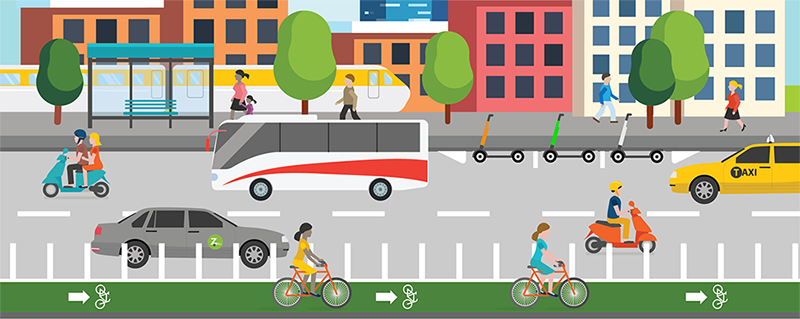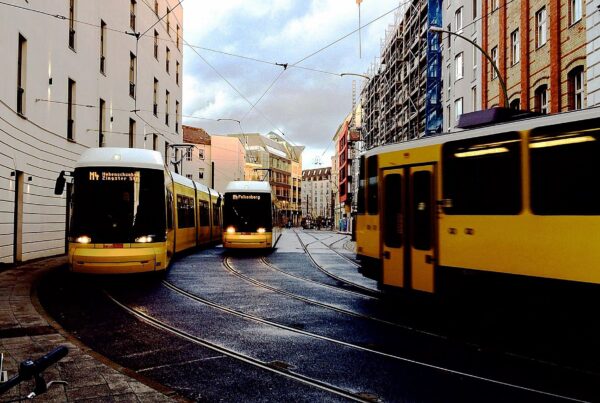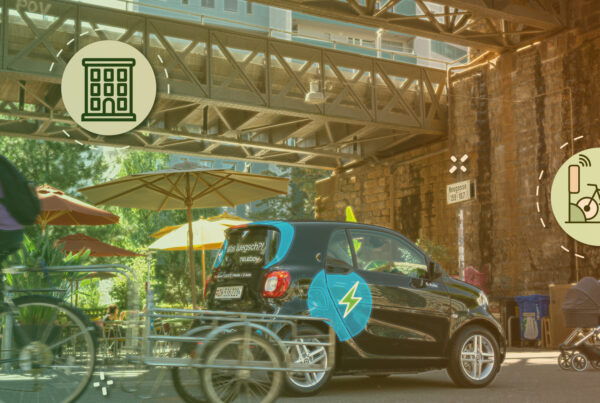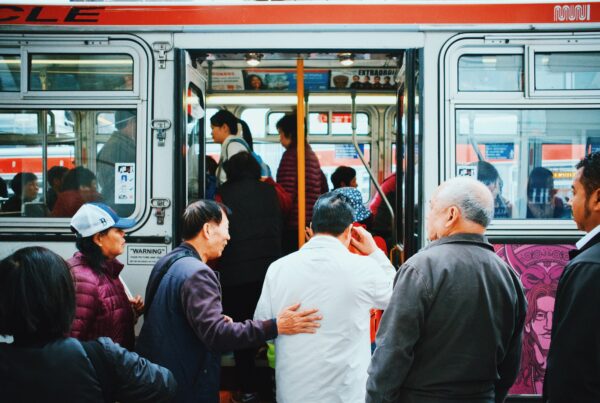Welcome to the Shared-Use Mobility Center’s weekly guide to the most impactful news, thought-provoking articles and innovative technologies that are shaping our transportation future. We believe in sharing information, just like sharing cars, bikes, and scooters, so if there’s anything additional you’d like to see, just drop us a line.
SUMC News and Announcements
It’s time for the first Mobility Hub Reader Survey! It is conveniently short and your responses will help us shape future issues.
Our new CEO Benjie de la Peña is in the news
Benjie talks to Smart Cities Dive’s Cailin Crowe about transportation’s ‘moment of inflection’ and mobility opportunities that have arisen in these pandemic times. Read the interview here and don’t forget to sign up for the Inflection Reflection Webinar on February 17th.
This one-hour virtual event features a panel discussion with four important voices and thought leaders who will share their insights on the deep, systemic changes that are happening and need to happen to push the transportation system towards sustainability and equity — it’s moderated by Benjie.
New on the SUMC Blog: The Transactional Data Specification: A Building Block for Equitable Mobility-as-a-Service
A simple, but integral transactional data specification for demand-responsive transportation holds the promise of creating a stronger, more equitable transportation system. Get the details in this blog post by Jana Lynott, Senior Strategic Policy Advisor of the AARP Public Policy Institute and SUMC Board member, and Founder in Residence, Sharon Feigon.


New Learning Module: Setting Goals and Performance Metrics
Successful shared mobility projects require a clear vision of goals and associated performance metrics. (This is fundamental to addressing complex and systemic issues, such as equity, community engagement, accessibility, and sustainability.) Take a look at this new learning module that serves as a mode-agnostic framework for setting goals, measuring performance metrics, and evaluating outcomes for shared mobility projects.
The National Aging & Disability Transportation Center will host two webinars on COVID relief funding (CRRSAA) specifically available for Enhanced Mobility for Seniors and Individuals with Disabilities Program (Section 5310) grantees. One webinar will be targeted towards direct and designated recipients and the other for sub-recipients and Tribes. Sign up on the NADTC website.
National RTAP 2021 Intercity Bus Survey and Roundtable
The National Rural Transit Assistance Program National (RTAP) needs your help updating resources and training materials for the Rural Transportation and Intercity Bus Program. If you can, take the 5 min survey by February 12th and help them determine what topics and issues are a priority.
Mobility Justice
The Biden Administration is acting fast to appoint climate policy leaders to ramp up environmental justice initiatives, building a unified coalition (finally) to address issues at the intersection of racism, climate change, transportation equity, and public health.
Irene Marion, one of Biden’s notable appointees, might sound familiar to fans of equity advocacy and the Portland Bureau of Transportation—with Irene taking the reigns as director for Departmental Office of Civil Rights and two other Portlanders joining USDOT to pursue mobility justice at the federal level.
Over a quarter of fatal shootings of unarmed Black women and men in the US occur during traffic stops found NPR, flagging the immediate need for actionable police accountability in law enforcement. Also, why do traffic cops have guns in the first place?
We applaud Illinois’ decision to end the suspension of driver’s licenses from unpaid automated traffic tickets, an outcome that disproportionately impacted Black and Brown areas, and often deprived people of a way to get their job or access essential services.
Ridehailing/Carsharing/Carpooling
The savior for cash-strapped transit agencies is….Uber? Mobility maven David Zipper examines real-world cases of agencies hopping aboard Uber’s microtransit plan outlined in the ridehailing giant’s latest report “Towards a New Model of Public Transportation.”
There is a resilient determination in the taxi cab co-op that unifies worker-owned transportation initiatives and powerful partnerships with other employee-owned cooperatives to serve vital mobility needs. This is what happens when drivers run a transportation company.
We love to see efforts like Chinese ridehail giant Didi Chuxing’s pledge of $10 million to support COVID-19 vaccinations in 13 global markets to help subsidize costs for people traveling to vaccine appointments and healthcare workers riding to vaccination hubs.
Ridehail drivers in Chicago made below minimum wage in 2019, according to a new report from the Illinois Economic Policy Institute. Mobility companies must do better.
Bikesharing and Micromobility
The bike boom of 2020 led to a renewed public focus on expanding sustainable mobility options in our communities, but a lack of safe storage and parking space in metro areas like New York City could stop that progress.
Spin is on the test track, trying out a remote-operated, three-wheeled vehicle with technology provided by robo-mobility startup Tortoise that aims to reduce sidewalk clutter and improve rebalancing operations and testing an in-app “scooter hailing” feature slated for later this year.
“…(a) major part in changing the way people travel is not only about street design. It’s about helping people change their habits through behaviour change programmes specially tailored to their needs.” Learn about the importance of merging safe paths with engaging education in this latest post by Sustrans.
VIDEO: Check out this informative guide from the Dutch Cycling Embassy on four design principles for improving cycling space with “bicytecture” in crowd-heavy areas like transit stations and major shopping districts.
Transit
Even with city and state mask mandates in effect since mid-2020, we commend President Biden for issuing a federal executive order mandating face coverings for employees and passengers on all forms of public transportation to curb the spread of COVID-19.
Electrify the ride to school! First Student, First Transit, and NextEra Energy Resources have teamed up to grow electric school bus fleets in the US and Canada, starting with First Student’s fleet of 43,000 school buses across 40 US states and seven Canadian provinces.
Illinois’ Regional Transportation Authority is backing up its support for equitable public transportation by focusing its $486.2 million in stimulus funding on transit-dependent riders, who are often essential workers, during the ongoing pandemic.
Bus lanes, bikes, and more open streets are on New Yorkers’ minds according to a Siena College poll commissioned by NYC active transportation nonprofit Transportation Alternatives—reporting that 56% of voters support “protected citywide bus lanes” replacing some parking spots.
Technology
Autoweek analyzes the National Highway Traffic Safety Administration’s latest updates of self-driving vehicle rules with Level 3, 4, and 5 autonomous systems, including new terms, tech definitions, and regulatory requirements.
The “But where to charge?” question may finally get an answer with the Biden Administration’s $1.7 trillion clean energy plan to spur EV sales and kick EV charging infrastructure buildout into overdrive.
In a partnership with curb space management company Coord to clean up local traffic, the City of West Palm Beach has launched a Smart Zone pilot program that gives commercial drivers the ability to locate, reserve, and pay for time at nearby loading zones.
Take an autonomous trip down memory lane with Streetsblog’s historical dive into self-driving tech development in the US through an interview with transportation reporter Alex Davies about his new book, “Driven: The Race to Create the Autonomous Car”.
Sustainability
AUDIO: Tune in to this Telekinetic episode with Carlos Pardo of NUMO that discusses the concept of “Transportation Avoidance” and how the movement shifts as a result of teleworking affect the innate need to travel and have face-to-face interactions, as well as urban planning.
What makes people value public places they don’t own? Researchers sought to find out with four studies that tested “psychological ownership” of spaces using simple, inexpensive requests, like finding a nickname for a lake or planning a route on a park map, to gauge how appreciation for public spaces grows when you add a personal connection to the mix.
“Last year, as pandemic lockdowns put travel on hold, wealthy countries reduced their environmentally-harmful emissions in almost every sector of their economies. There was one exception…one big, road-hogging, gas-guzzling exception.” Read about SUVs and carbon emissions on NPR.
It’s not pedestrian infrastructure if it serves the needs of cars, not pedestrians. City Observatory regular Joe Cortright pulls apart the auto-centric, multi-lane-crossing disaster project that is The Energy Corridor District protected intersection where a few garnishes do little to make it walk, bike, or roll-friendly.
How do we translate care into action to resist forces beyond our understanding? This engaging story from ProPublica documents one man and his family’s journey as climate scientists and activists, asking fundamental questions about what we, as humans, can do to mitigate our modern environmental crisis.
Requests for Proposals, Inquiries, and Opportunities
SUMC is hiring!
We’re looking for a temporary bookkeeping and administrative assistant with long-term potential.
Featured Equity Opportunities
Diversity Equity and Inclusion at Clean Energy Trust
The Clean Energy Trust is looking for climate entrepreneurs, and award opportunities are available specifically for women, Black, Indigenous, and/ or People of Color. Explore the different funding options and apply.
2021 Transportation Justice Fellowship
The National Association of City Transportation Officials (NACTO) seeks mobility practitioners who identify as People of Color to take part in a project-based fellowship program for mid-career professionals in the US. The Fellowship is an initiative of the Better Bikeshare Partnership. Get all the information here.
Project Funding Opportunities
RFP: Reconnect West Seattle Travel Options Programming Support
City of Seattle
Seattle, WA
Deadline: February 17, 2021
Human Service Transportation and Transit Service Coordination Plan
Ventura County Transportation Commission (VCTC)
Camarillo, CA
Deadline: February 22, 2021
South SH360 Corridor Development Strategy
City of Arlington, TX
Arlington, TX
Deadline: February 23, 2021
RFP: Paratransit Demand Response Services—ADA Complementary “ARide”
Ann Arbor Area Transportation Authority (TheRide) (AAATA)
Ann Arbor, MI
Deadline: March 3, 2021
Did someone forward this to you? Sign up for our newsletter here.




